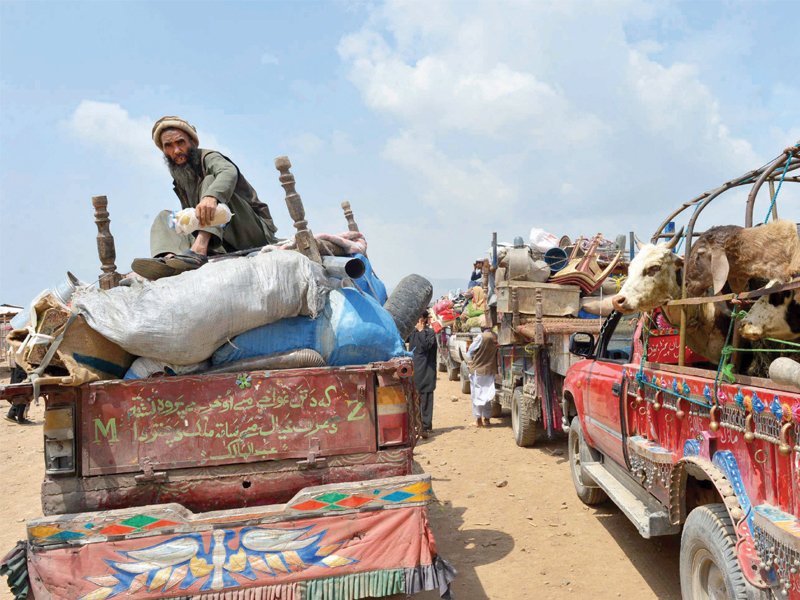
Security forces had launched an operation in the scenic area, comprising two valleys, on May 8. After 34 days, 70 militants and 21 security personnel have died and the remaining militants forced to flee.
While talking about the operation, commanding officer Colonel Waseem Zafar Bhatti said on May 6, less than a week before the elections, militants showed their presence in Para Chamkani. There was an explosion inside a mosque in Sawak which left 26 people dead.
In the mid of night
On the night of May 8, the troops were ordered to move towards the check post at Mohmand Top, a strategically important site and militant stronghold, situated on the edge of Para Chamkani. On May 10, small-scale clashes began between the forces and foreign fighters, primarily Uzbeks, and the local Tehreek-e-Taliban Pakistan (TTP), said colonel Waseem.
“Launching an operation is always a tough decision, not because the security forces are not capable, but because of the evacuation of the local population to safe places,” he told The Express Tribune. Militants had occupied 29 villages and started torching houses of tribesmen at the time.
According to Colonel Waseem, the forces continued to advance from both valleys while tribesmen from Lisyani, Khwaja Khel and Khwaji Khel vacated their houses and moved towards Lower Kurram. There the forces along with the political administration accommodated the displaced tribesmen in Durrani Camp, Tindo Camp and Shesho Camp.
After 34 days of small clashes, the militants fled Para Chamkani. “It was a three-sided infiltration by militants from Khyber Agency, Orakzai Agency and across the Afghan border,” stated Waseem. He added the militants were commanded by TTP chief Mullah Toufan from Orakzai, who also fled along with his accomplices.
The operation was carried out swiftly because it was in proximity to Parachinar and Sadda, where both Sunni and Shias reside.
“We operated to foil the militants from scuppering the Sunni-Shia peace deal,” explained the commanding officer.
Waseem said after security forces received intelligence information about the militants’ attempts to gain sympathies of the locals, they conducted the offensive. The colonel maintained the TTP and its allies were wiped out by ground troops and aerial assistance, securing the area from sectarian violence.
Meanwhile, Assistant Political Agent (APA) Central Kurram Muhammad Naeem said after the area was cleared they announced repatriation for the internally displaced persons (IDP). The World Health Organization will provide the IDPs with ration for three months and the Fata Disaster Management Authority will provide transportation, added the APA.
What the tribesmen say
A resident of Tabai village at Durrani Camp in Sadda, Janab Gul told The Express Tribune he visited his village two days ago to see what remained of his house and only found rubble. “We were told by the forces to leave overnight soon after the blast in the mosque.”
Though there were militants in Para Chamkani before the operation, they were not present in great numbers to occupy the area, explained Gul. His family plans to leave the camp in a day or two.
Abdul Shahi, a tribal elder from Para Chamkani lashed out at the authorities. “We were told ‘peace will be restored in your area’ but we lost everything.” All of Kamal Baz village has been destroyed, added Shahi.
Nearly the entire population of Para Chamkani has suffered because of the operation in one way or the other. Most of the affected complained about a lack of ration and the unavailability of basic facilities like health services.
A majority of the population made their living rearing cattle on abundant natural pastures and most of them lost their herds as they evacuated overnight. The fear of heavy clashes and fleeing from their homes is stamped all over the unkempt faces of children who gather at the camps’ watering point.
We have been given soaps and towels by camp authorities but we have not had a bath since we left our houses, said a group of children. Water is only available for drinking, not bathing.
Though Para Chamkani is said to be cleared of militants, locals do not want to venture back. It is not love for life in a camp which makes them hesitant, it is the thought of returning to demolished homes where their sources of income have been destroyed along with their peace of mind.
Nearly all the camp residents suffer from various skin ailments. While they blame the political administration for their condition, it is difficult for them to speak bluntly. One thing which is evident is that the tribesmen believe they can restore peace in their region on their own, and would not want another military operation.
Published in The Express Tribune, July 1st, 2013.
COMMENTS (3)
Comments are moderated and generally will be posted if they are on-topic and not abusive.
For more information, please see our Comments FAQ











Our brave soldiers have killed 70 militants in five weeks of operation. These terrorists kill more people in a single terror attack!
"the thought of returning to demolished homes where their sources of income have been destroyed along with their peace of mind." +++++++++++++++++++++++++++++++++++++++ a typical case of throwing the baby with the bath water......
Thats the problem with the tribesmen: they can restore peace in their region. They have had peace for long when there were numerous blasts elsewhere. If you let them live among you, when the side strikes back, you loose your home.